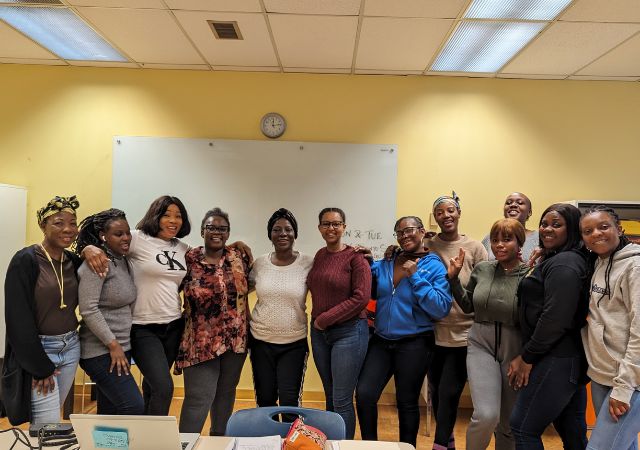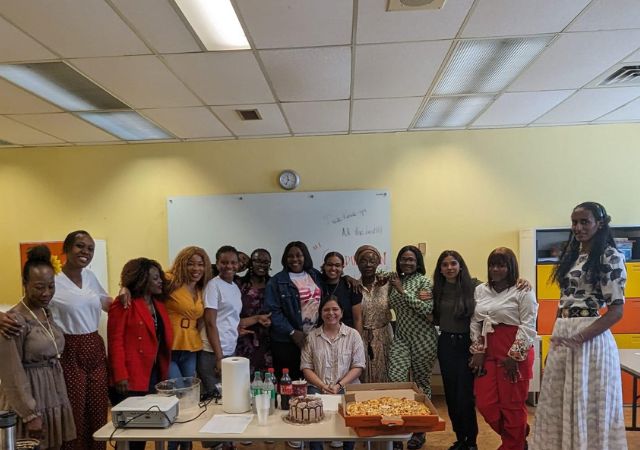The Inclusion Project
About Us
What is mindful/meaningful inclusion?
The world has crossed the first quarter mark of the 21st century. Yet, women continue to face challenges in the workforce, whether it is pay and promotion disparity or leadership roles. An inclusive environment at your workplace should not merely look at representation in diversity. It needs to go a step further and look at diversity in employee barriers as well.
The inclusion project aims to help businesses identify these barriers for women at their workplace and accommodate their needs for a meaningfully diverse work environment.
Why does it matter?
How do you want to be seen?
- Position yourself as a leader for social change.
- Build yourself as a business with a growth-oriented mindset.
- Advocate for diverse representation by accommodating the needs of women in your workforce.
How do you want to retain your employees?
- Hire and retain employees to build a diverse workforce.
- Introduce inclusive hiring templates and policy framework to retain employees
What can you do?
Proposed Collaboration Opportunities
- Employment & Mentorship Partnership – Become an employer, mentor, and/or resource partner for the Inclusion Project.
- Engagement in Events & Media – Participate in our speed mentoring event and feature in our podcast to share insights and expertise.
- Employer Network Collaboration – Gain access to our specialized tools and templates curated by CEC, in exchange for employer feedback to enhance our resources.
- Program Partnership – Collaborate with community partners & programs to provide our women with industry knowledge, networking and development opportunities.
What does a successful collaboration look like in the long run?
- Systemic Changes
- Redefine Business Narrative
- Advocacy for and with representation
- Employee Retention
- Increase in jobs for women that accommodate their needs.
Work We’ve Done
Street Haven’s Inclusion Project held four focus groups between Dec 2024 and May 2025, engaging 35 women from diverse backgrounds—including newcomers, refugees, and long-term residents. With experience in sectors like construction, healthcare, hospitality, and retail, most participants were on OW or ODSP and shared a strong desire to work and contribute—if given a fair chance.
- Systemic Barriers Persist :
Many workplaces across Ontario continue to present significant challenges, especially for women in male-dominated industries and racialized communities.
- Mixed Experiences :
While some participants shared encouraging stories of inclusion and progress, others highlighted ongoing struggles.
- Discrimination & Exclusion :
Common themes included workplace discrimination, feelings of exclusion, and limited representation in leadership roles.
- Underrepresentation :
Racialized women and those from marginalized backgrounds reported a lack of visibility and advancement opportunities.
Key Findings
- Gender Bias in Male-Dominated Industries: Women working in construction, security, warehousing, and manufacturing consistently reported being relegated to less technical or visible roles. Despite having equal or superior skills, many were denied the opportunity to operate equipment or take on leadership roles. Some chose self-employment to avoid toxic environments altogether.
- Lack of Inclusive Workplace Policies: Several women noted the absence of practical accommodations such as maternity leave, period leave, or proper uniforms and washrooms. Others shared how limited flexibility or micromanagement from supervisors—regardless of gender—undermined their confidence and productivity.
- Impact of Newcomer Status: Refugee and newcomer participants highlighted additional barriers: non-recognition of international credentials, limited access to certification programs, and the pressure to start from scratch despite extensive work experience abroad. A few emphasized the urgent need for accessible upskilling and career transition programs.
- Intersectional Discrimination: Participants reported layered discrimination based on race, language, nationality, and religion. Many described being underestimated, overlooked, or treated differently in multilingual or multicultural environments. Others pointed out biases even from colleagues of the same gender or cultural group.
- Positive Workplace Practices: Some workplaces stood out for their efforts to foster inclusion—through mentorship, balanced leadership, flexible work hours, and D&I training. These examples demonstrated the potential for transformation when employers actively commit to equity.
What We Recommend
Based on these conversations, our clients call for the following workplace improvements:
- Clear, enforced anti-discrimination and harassment policies.
- Mentorship and leadership pathways for women and newcomers.
- Transparent pay structures and promotion criteria.
- Certification and upskilling opportunities for career advancement.
- Inclusive and gender-neutral job descriptions.
- Flexible and family-friendly workplace accommodations.
A Call to Action for Employers
The Inclusion Project emphasizes that DEI must go beyond policy. It must be lived in every role, every policy, and every leadership decision. Through continued research, community conversations, and employer partnerships, we aim to close the gap between talent and opportunity—creating workplaces where all women, regardless of background, can thrive.
Frequently Asked Questions (FAQs)
What is the Catchment area for this project?
As a federally funded initiative supported by Women and Gender Equality Canada, The Inclusion Project is open to businesses and organizations across all provinces and territories in Canada. Our goal is to create national impact by equipping employers from coast to coast with the tools to build more inclusive workplaces.
Mode of interaction?
Our services are fully mobile and accessible, designed to meet organizations where they are. We offer virtual consultations and training sessions nationwide, and in-person support within the Greater Toronto Area (GTA). Whether you’re a small business in a rural community or a national company in an urban centre, we’re here to help you implement practical, equity-driven solutions.
What’s in it for me?
As a business, you get to re-design the structure of your company from an inclusive lens. You get access to hiring templates, policy framework and other resources which will aid you to have a diverse and sustainable work environment. You get to position yourself as a leader in social change.
Why is inclusion impactful?
Statistics state that companies with diverse leadership are 25% more likely to outperform their peers financially. An inclusive workplace culture is critical for employee retention, brand positioning and social change when it comes to women in jobs.
I’m an employee and I feel my company can benefit from this project. What should I do?
You can speak to the Human Resources team in your company and have them reach out to us. Alternatively, you can contact us at training@streethaven.com and discuss with us how we can help you, and we will reach out to your company.
How can I request specific accommodations?
You can inform us about any specific accommodations, and we will ensure we accommodate them to the best of our abilities.
Are your programs/services free of cost?
Yes, there is no cost for any of our services.
How can I contact your team?
You can reach out to us via email on training@streethaven.com


